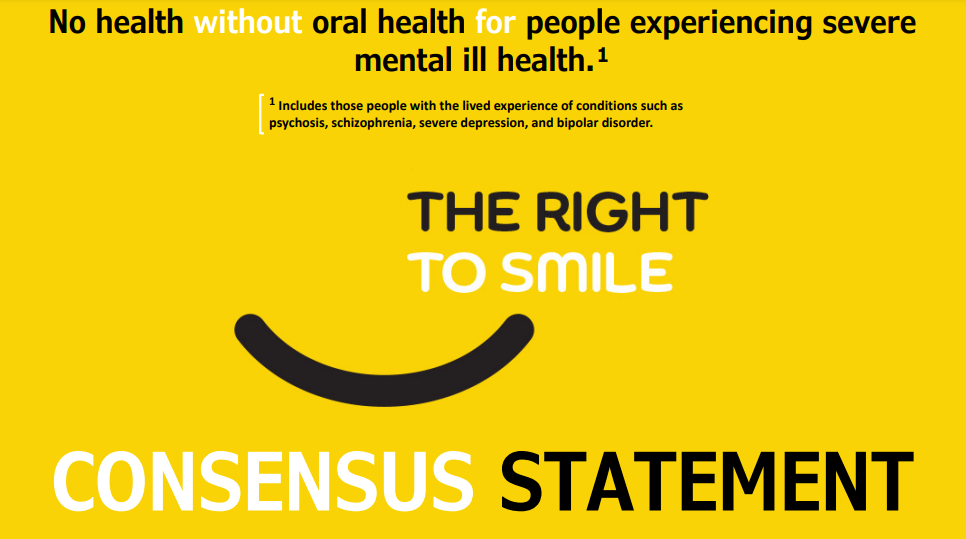David Shiers, Gordon Johnston and Vishal Aggarwal FCGDent believe that poor oral health need not be an inevitable consequence of experiencing severe mental illness.

Left to right: David Shiers, Gordon Johnston, Vishal Aggarwal FCGDent
In 2023 there can be no mental health without physical health, and no physical health without oral health. A recent bulletin by the Chief Dental Officer for England highlighted the scale of the challenge in addressing inequality in oral health for people with severe mental illness:
- On average people with severe mental illness are less likely to engage with oral healthcare, with a studyfinding that only 75% of schizophrenia patients brushed their teeth daily, compared to 96% in the general population.
- Poor mental health is often linked to other factors such as homelessness or substance use, which also have consequences for oral health.
- In a meta-analysis of studies, patients with severe mental illness were almost 50 times as likely to have periodontal disease.
- Patients with eating disorders had five times the odds of dental erosion. In patients with self-induced vomiting, the erosion rate was seven times higher.
Poor oral health may not be simply experienced as painful tooth decay or inflamed gums. It can have a major impact on the quality of peoples’ lives, including feeling ashamed to open your mouth because of bad breath or unsightly teeth affects how you feel about yourself. Lacking the confidence to laugh, smile, or be close to others, relationships can suffer, and functions as basic as talking and eating may be impaired.
Moreover, poor oral health may interact with other health conditions like diabetes and heart disease. For instance, poor oral health can upset diabetes control, while diabetes makes gum disease more likely. Diabetes and cardiovascular disease are particularly prevalent in this population, potentially creating a vicious cycle of interdependent difficulties for an individual.
Yet oral health is a forgotten health inequality. There is a growing interest in the importance of protecting the physical health of people with severe mental illness, but while welcome targets and strategies exist to tackle health inequalities for cardiovascular disease and diabetes, oral health remains largely ignored. Research has also largely ignored the need to improve outcomes for oral health of this vulnerable group. We need more understanding of what interventions work best, particularly in the early phase of psychosis; yet only one study to date has investigated this, The Three Shires study, which found that monitoring alone may be insufficient to change oral health outcome.
So what can general dental teams do? Oral health practitioners know that an ounce of prevention worth a pound of cure, and dental diseases like tooth decay, gum disease and oral cancer are preventable if good oral self-care behaviours are implemented at the outset. These include regular toothbrushing with a fluoride toothpaste, reducing frequency of sugar intake, and cessation of smoking and alcohol intake. We therefore need to shift our focus from ‘downstream’ treatments that commonly involve extraction of teeth and are offered in crisis for advanced tooth decay and gum disease, to ‘upstream’ prevention and early intervention when a diagnosis of severe mental illness is first established.
While the importance of supporting the physical health needs of people experiencing severe mental illness is now widely accepted, the consensus statement The Right to Smile advocates for a ‘whole-person’ approach which recognises that there can be no health without oral health.
To achieve this requires a ‘whole team’ approach right from the start, prioritising oral health from the onset of severe mental illness. The patient and their close supporters such as family must be actively engaged at the centre of the team in discussions about oral health. The mental health practitioner or team responsible for early diagnosis and treatment should consider oral health needs from the outset. The dental professional is responsible for ensuring optimal oral health but should also be alert to possible severe mental illness in individuals attending with unusual dental presentations. They must also be aware that people with psychosis are a high-risk group for poor oral health including oral cancer. Finally, commissioners need to prioritise dental access for people with severe mental illness as a vulnerable group, for instance ensuring the availability of free or subsidised care.
There are many opportunities for dental services to support people with severe mental illness. They can recognise and prioritise their oral health needs by initiating early intervention to prevent poor oral health outcomes. They can adopt a whole-person approach in managing the impact of poor oral health on severe mental illness, particularly in relation to social avoidance from poor oral health outcomes related to bad breath and poor aesthetics. And they can be aware of dental presentations of severe mental illness which can alert to a possible diagnosis, and provide immediate onward referral to mental health services if severe mental illness is suspected from dental presentations.
It’s time to raise the expectations of those using mental health services to receive higher standards of oral healthcare. If we equip people with the right knowledge and skills, while supporting the adoption of healthy routines including regular dental check-ups before things go wrong, we can make a real difference to an individual’s health and their wellbeing.
Vishal Aggarwal FCGDent is a clinical academic dentist, currently Clinical Associate Professor in acute dental care and chronic pain at University of Leeds Dental School, with research and clinical interests including improving oral health outcomes in vulnerable populations. David Shiers is a carer and former Joint National Lead for the Early Intervention in Psychosis Development Programme (2004-10), and an expert advisor for the NICE Centre for Guidelines. Gordon Johnston is a peer researcher with lived experience of bipolar.
The Right to Smile consensus statement was developed by an oral health group spanning experts with lived experience and colleagues from primary care, mental health, and dentistry. The group was established by the Closing the Gap Network
Download The Right To Smile consensus

References:
- NHS England and NHS Improvement, Special focus: Dentistry and patients with mental illness. Your NHS dentistry and oral health update. 2021 Nov; issue 32. https://createsend.com/t/d-79BC6639C9930B492540EF23F30FEDED
- McCreadie, R.G., Stevens, H., Henderson, J., Hall, D., McCaul, R., Filik, R., Young, G., Sutch, G., Kanagaratnam, G., Perrington, S., McKendrick, J., Stephenson, D. and Burns, T. (2004), The dental health of people with schizophrenia. Acta Psychiatrica Scandinavica, 110: 306-310. https://doi.org/10.1111/j.1600-0447.2004.00373.x
- Adams, C. E., Wells, N. C., Clifton, A., Jones, H., Simpson, J., Tosh, G., … & Aggarwal, V. R. 2018. Monitoring oral health of people in Early Intervention for Psychosis (EIP) teams: The extended Three Shires randomised trial. Int J Nurs Stud, 77, 106-114. https://pubmed.ncbi.nlm.nih.gov/29078109/
- Kisely S, Baghaie H, Lalloo R, Siskind D, Johnson NW. A systematic review and meta-analysis of the association between poor oral health and severe mental illness. Psychosom Med. 2015 Jan;77(1):83-92. doi: 10.1097/PSY.0000000000000135. PMID: 25526527.
- Turner E, Berry K, Aggarwal VR, Quinlivan L, Villanueva T, Palmier-Claus J. Oral health self-care behaviours in serious mental illness: A systematic review and meta-analysis. Acta Psychiatr Scand. 2022 Jan;145(1):29-41. doi: 10.1111/acps.13308.
- Kang J, Palmier-Claus J, Wu J, Shiers D, Larvin H, Doran T, Aggarwal VR. 2022. Periodontal disease in people with a history of psychosis: Results from the UK Biobank Population-based Study. Community Dentistry and Oral Epidemiology
- Turner E, Berry K, Quinlivan L, Shiers D, Aggarwal V, Palmier-Claus J. 2023. Understanding the relationship between oral health and psychosis: qualitative analysis. British Journal of Psychiatry. 9(3)
- Elliott E, Sanger E, Shiers D, Aggarwal VR. 2022. Why does Patient Mental Health Matter? Part 3: Dental Self-Neglect as a Consequence of Psychiatric Conditions. Dental Update.
- Elliott E, Sanger E, Shiers D, Aggarwal VR. 2022. Why does Patient Mental Health Matter? Part 2: Orofacial Obsessions as a Consequence of Psychiatric Conditions. Dental Update.
- Aggarwal VR, Sanger E, Shiers D, Girdler J, Elliott E. 2022. Why does Patient Mental Health Matter? Part 5: Chronic orofacial pain as a consequence of psychiatric disorders. Dental Update.
- Elliott E, Sanger E, Shiers D, Aggarwal VR. 2022. Why does Patient Mental Health Matter? Part 4: Non-carious Tooth Surface Loss as a Consequence of Psychiatric Conditions. Dental Update.


